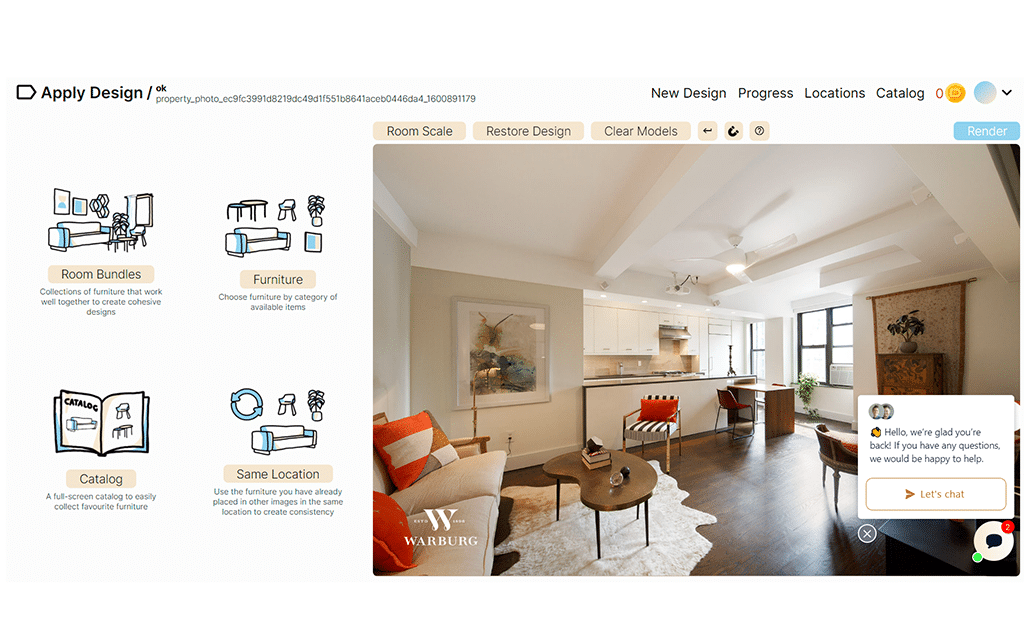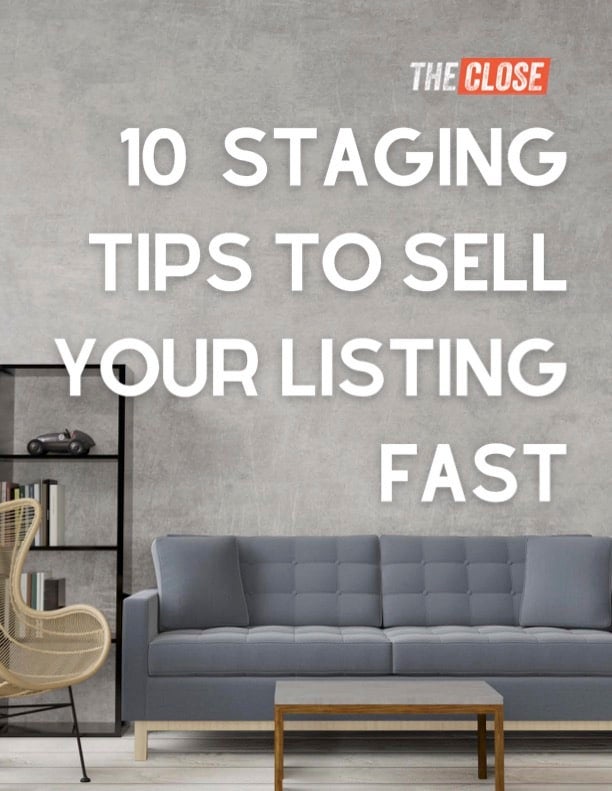Ever seen a property listing with no furniture or really bad furniture? Since you’re a real estate professional, it may be easy for you to visualize the potential in those properties, but for most buyers, that is very difficult. Enter virtual staging: the perfect way to make a space beautiful and appealing when listing photos. I gathered the best virtual staging software based on pricing, design quality, and features so you can create stunning and realistic spaces. Also, I’ve included a guide of tips and tricks to help you along the way. Let’s get started!
- Styldod: Best for quick turn-around times
- Tantify: Best for high-end, realistic staging
- BoxBrownie: Best for a variety of virtual services
- PadStyler: Best for customization and furniture selection
- Stuccco: Best for do-it-yourself (DIY) and ease of use
- Apply Design: Best for on-the-spot revisions
The Close’s Picks for Best Virtual Staging Software
| Type of Software | Best For | Price Per Image | Learn More Below |
|---|---|---|---|
| Styldod | Quick turn-around times | $16 | Styldod ↓ |
| Tantify | High-end, realistic staging | $69 | Tantify ↓ |
| BoxBrownie | Various virtual services | $24 | BoxBrownie ↓ |
| PadStyler | Customization and furniture selection | $29 | PadStyler ↓ |
| Stuccco | DIY and ease of use | $15 | Stuccco ↓ |
| Apply Design | On-the-spot revisions | $10.50 | Apply Design ↓ |
Styldod: Best for Quick Turnaround Times

Why I Chose Styldod
Talk about home improvement! With Styldod’s super-fast turnaround time (24 to 48 hours), agents will be listing properties in no time and attracting buyers right away. Plus, with prices starting at just $16 per image, it’s budget-friendly without skimping on quality. Customers love that Styldod offers a bunch of design options and super realistic renderings, making listings look their best. Not to mention, you get unlimited revisions if you want to make any changes.
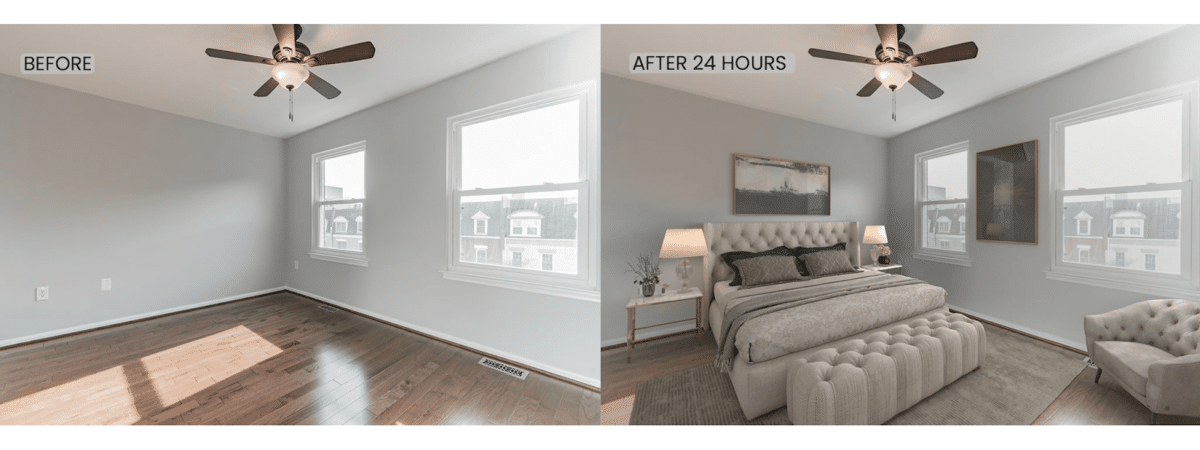
Additional Features
- AI object removal: This is great for agents who want to remove an object or two from an existing photo without virtually staging an entire room.
- Real estate video maker: Agents can create a free listing video in minutes with premade templates.
Tantify: Best for High-end, Realistic Staging

Why I Chose Tantify
Tantify is all about turning boring property photos into stylish, inviting spaces with its virtual staging magic. It provides high-end virtual staging that results in super-realistic, high-quality images that catch the eye of potential buyers.
It has the best image quality and interior design taste that we know of among staging service providers. While it doesn’t offer virtual house staging software for real estate agents, it consistently puts out photorealistic virtual staging images with stunning interior design.
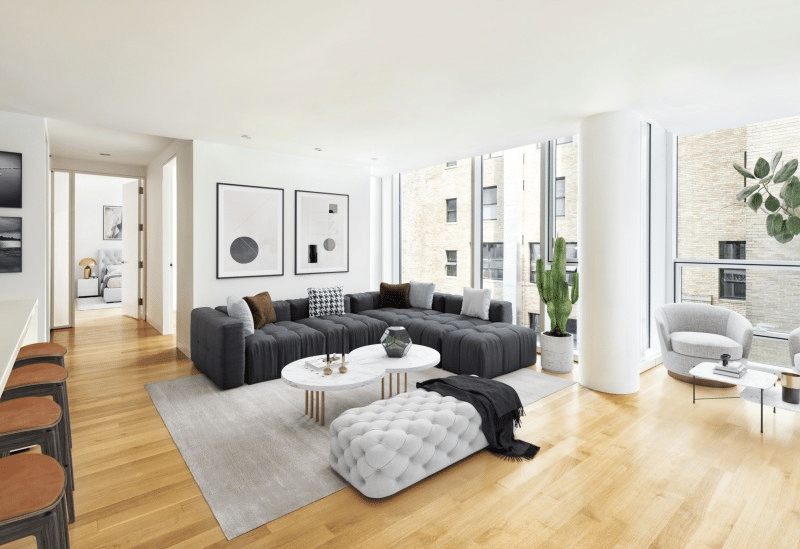
Additional Features
- Realistic renderings: The bottom line—these photos look real. This may be the most expensive option, but it also produces the best results for luxury agents.
- Quick redesign and virtual renovation: Remove unwanted furniture to upgrade a space without virtually staging the entire room. If you have a commercial space or a property that needs an overhaul, consider purchasing the renovation option for complex listings.
BoxBrownie: Best for Variety of Virtual Services

Why I Chose BoxBrownie
BoxBrownie does it all by offering virtual staging, photo editing, floor plan, 360° virtual tours and more. It’s actually my go-to for real estate photo edits, and so far it has not let me down. Sure, some of the premium options cost more, but the results are worth it. I love having everything I need in one place, no matter what project I’m working on. And its customer service?—Chef’s kiss!

Additional Features
- Floor plans: Turn the typical, hard-to-read floor plan into a work of art with BoxBrownie’s virtually staged floor plans. I love seeing these on listings!
- Professional copywriting: Now that you have these beautiful photos, you have to write a listing description. If you feel stuck, BoxBrownie has copywriting options for you.
PadStyler: Best for Customization & Furniture Selection

Why I Chose PadStyler
I went with PadStyler because it lets me play interior designer without breaking the bank. Sure, it’s got a bit of a learning curve with all the customization options, but once you get the hang of it, you can really make each room pop. I love how I can pick from a huge library of furniture and decor to match any style I need. Plus, the detailed options mean I can get everything just right for each property. It’s like having a virtual decorating party right at my fingertips!
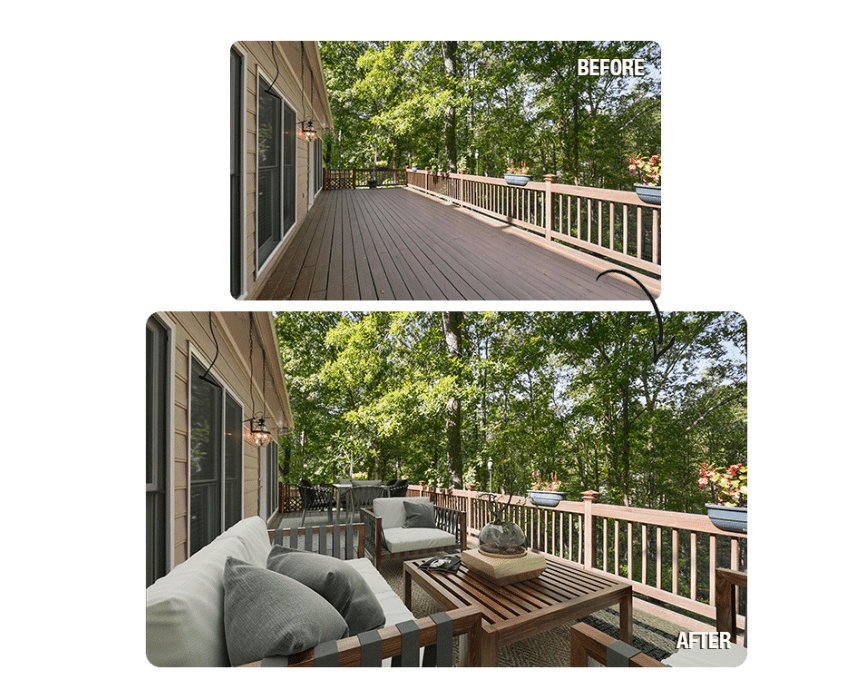
Additional Features
- 3D walkthrough: Perfect for new construction properties, you can show potential buyers what the house can look like once it is finished.
- Schedule an actual photoshoot: If you’re in Austin, Texas—you’re in luck. Not only does PadStyler have virtual staging options, but it also has professional photographers available in your area.
Stuccco: Best for DIY & Ease of Use

Why I Chose Stuccco
Stucco gets the job done with its no-hassle virtual staging. It may not offer all the bells and whistles like some other providers, but you don’t have to be a design guru to get results you’ll love. If you’re looking for DIY virtual staging, this program is easy to use and perfect for an agent on a tight budget. While the pricing structure can seem overwhelming, it does allow you to only pay for what you need.
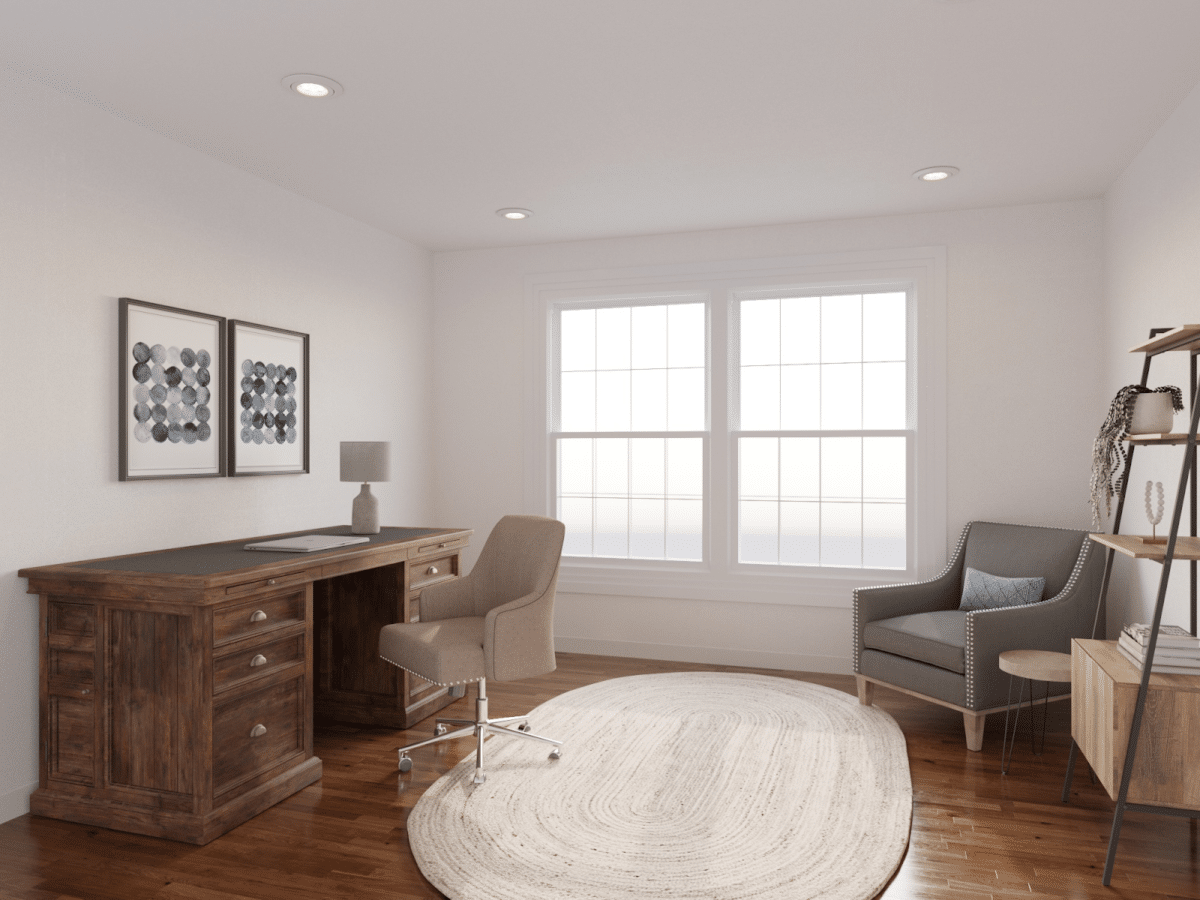
Additional Features
- Listing pages with stats: Listing pages allow you to manage who sees this page and its contents. When you share it, you’ll be able to track the buyer traffic, leads, and conversion rate.
- Lead capture: Upgrade your plan so homebuyers can share their contact info on your property Listing Pages, making it easy to capture buyer leads and follow up with them.
Apply Design: Best for On-the-Spot Revisions

Why I Chose Apply Design
Apply Design is an easy-to-use app that allows anyone to quickly stage their listings. Apply Design is one of the only virtual staging apps on the market that still allows agents to do their own virtual staging. It’s also very easy to use and includes a large number of tasteful, high-quality renderings of furniture, art, lighting, rugs, plants, and other home furnishings.
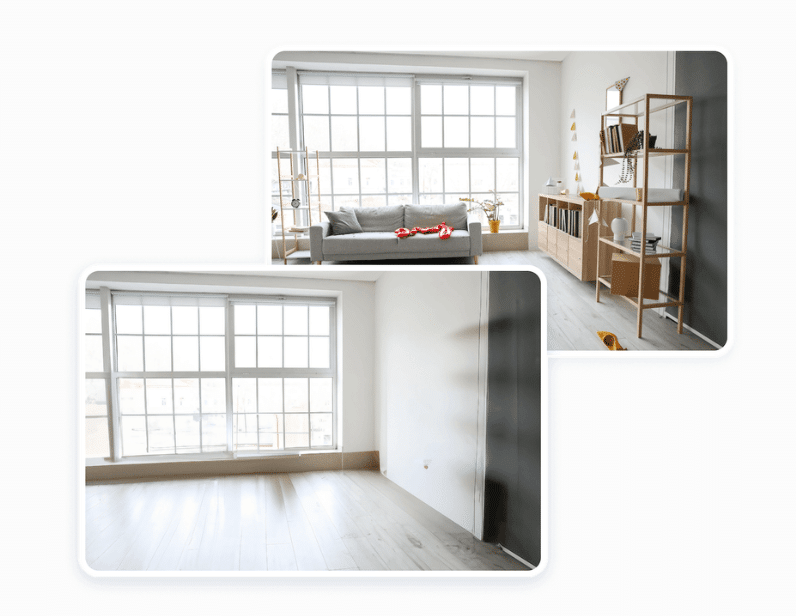
Additional Features
- AI decluttering: Remove the existing furniture or other clutter automatically by simply checking a box.
- On-the-spot revisions: Make quick changes with Apply Design’s drag-and-drop editor. Customize any real estate photo in a snap.
The Ultimate Virtual Staging Guide
So, you want to know how to do virtual staging? At the end of the day, picking a virtual staging software is just as important as knowing the best virtual staging tricks. That’s why I added this virtual staging guide to give you easy steps, insider tips, and cool examples to help you become a virtual staging pro. Whether you’re just starting out or already a staging whiz, this guide will help you rock any virtual staging tool and make your properties look amazing.
As an added bonus, you can download our top 10 staging tips for free:
What Is Virtual Staging?
Virtual staging is like magic for your property photos. Instead of lugging heavy furniture around, you use fancy tech to digitally spruce up empty rooms. It’s like giving your place a stylish makeover without breaking a sweat (or your back!). Virtual staging spruces up listings, making them look lived-in and super inviting to potential buyers. It’s the secret weapon for selling homes faster and making them look totally Instagram-worthy!
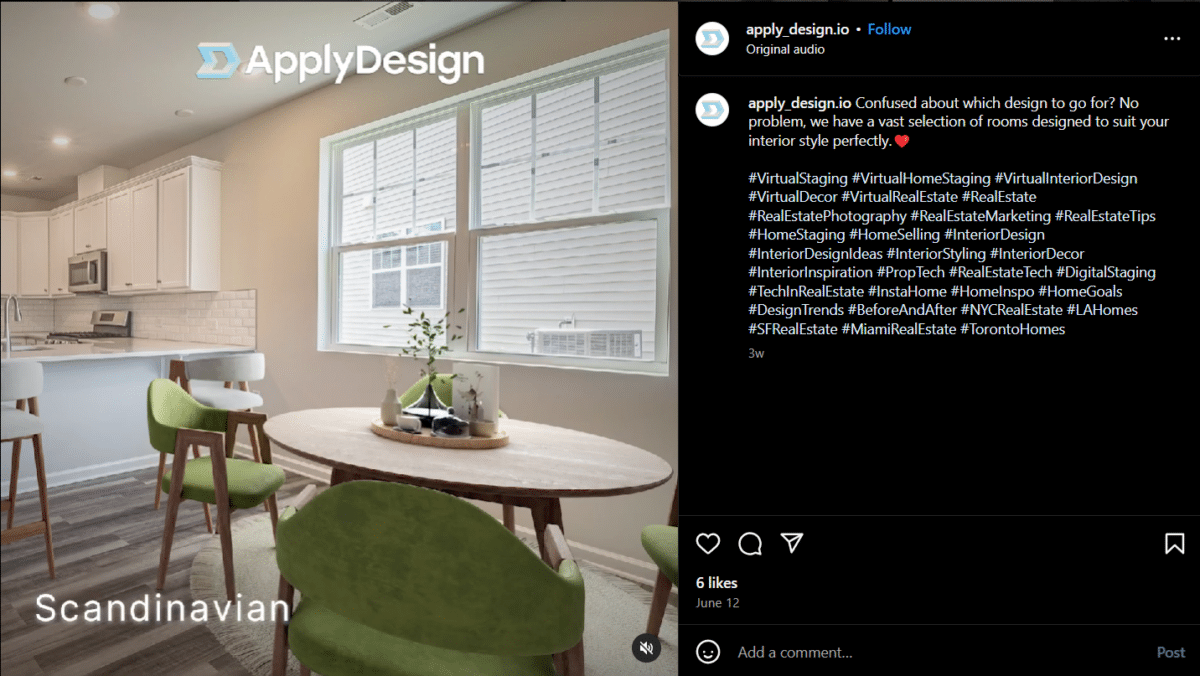
When to Use Virtual Staging
When should you use virtual staging products when selling a home? Anytime is perfect for showcasing the potential of a space without the hassle and cost of physically staging it. Plus, you can target different buyer demographics by styling rooms to suit various tastes—turning that spare room into a cozy office or a kids’ playroom with just a few clicks.
Let’s take a look at some of the best reasons to use virtual staging:
- Empty spaces: Transform vacant rooms into furnished, inviting spaces.
- Outdated decor: Update the look of a home with modern furnishings and decor.
- Cost-effective makeover: Stage a property without the expense of traditional staging.
- Targeted marketing: Customize staging to appeal to specific buyer demographics or lifestyles.
- Quick sales: Attract more interest and potentially sell properties faster with visually appealing listings, especially if a property is lacking; uh-hum—appeal.
- Creative flexibility: Experiment with different layouts and designs to showcase a property’s full potential.
Differences Between Traditional vs Virtual Staging
Many agents ask, Is virtual staging really as effective as traditional staging? Virtual staging can be a highly effective alternative to traditional home staging, offering cost savings, flexibility, and the ability to reach a wider audience with appealing pics. However, the effectiveness ultimately depends on the specific property, target market, and the quality of the virtual staging itself.
Let’s take a look at the pros and cons of each type of staging to help you determine which method is right for your listing. First up, traditional staging:
|
|
|
|
|
|
Now, let’s take a look at the upside and downside of virtual staging:
|
|
|
|
|
|
Whichever way you decide to stage a home, be sure to chat with your sellers about how they feel about any disruptions or how easy it’ll be for them to use.
Decide Your Budget & Pick a Great Virtual Staging Software
When you’re choosing the best virtual home staging software, start by figuring out your budget. Software costs can vary a lot, so it’s important to find one that fits your wallet. Check out what each software offers by returning to the above section—things like lots of furniture choices, realistic-looking designs, and how easy it is to use. Then make sure your budget aligns and get to work!
Do’s & Don’ts of Virtual Staging
So, now that you know what you’re going to do, let’s talk about some best practices for virtually staging a property. Choose furniture setups that enhance the space without making it look cramped. Make sure the virtual staging shows off natural light and highlights what makes your property special. Skip the overly fancy or too-personal decorations that could distract potential buyers or renters.
Keeping it simple and inviting will help you create digital presentations that catch eyes and make a great impression. It’s the little things that we can sometimes overlook, like curb appeal.
Here are a few do’s and don’ts to get you started.
Show Off Your Masterpiece
You’re done, you did it! Now, gather those beautiful masterpieces and get to marketing your listing. The house won’t sell itself, but your newly staged photos just might.
Frequently Asked Questions (FAQs)
What programs do virtual stagers use?
Virtual stagers have a blast using all sorts of cool software! From BoxBrownie’s do-it-all magic to PadStyler and Stuccco’s creative playgrounds, there’s something for everyone. Apply Design even makes it super easy to enhance listings right from your favorite real estate platforms. These programs let real estate agents, homeowners, and stagers turn dull spaces into must-see homes that catch buyers’ eyes and imagination.
Can I do virtual staging myself?
Yes! A few of the virtual staging programs for real estate offer DIY software. You don’t need to be a tech guru to use them, but you will need a sense of design to make sure the rooms look visually appealing.
How do realtors do virtual staging?
Realtors use virtual staging software to create digitally furnished homes to appeal to potential homebuyers. Start by taking high-quality photos of the rooms you want to stage, then upload them into virtual staging platforms like BoxBrownie or Stuccco. You can choose from various style types, furniture, and decor to bring boring and empty spaces to life. Once the photos are finished, realtors use them in their marketing materials to entice buyers to see a property’s potential.
How much does a visual stager cost?
That’s a tough one. Prices vary widely based on the number of photos being created, how much staging is necessary, and the complexity of the project. On average, the cost of virtual staging can range from $25 to $75 per image, with costs going much higher for higher-quality, luxury, or complex projects. If you don’t like an image, a revision may be necessary—so be sure to check if your provider includes changes in the cost.
Methodology: How I Chose the Best Virtual Staging Software
Our methodology at The Close ensures that our team of professionals, writers, and editors thoroughly analyzes each software. We meticulously evaluate the affordability, features, usability, customer support, and reviews of the virtual staging software available for real estate to determine our expert score.
We picked the best and most reliable virtual staging software to help real estate agents boost their business and sell their listings. Our thorough selection process ensures that our top picks make it easier for agents to streamline their work, impress clients, and hit their business goals.
Detailed criteria included the following to determine the best real estate virtual staging software:
- Affordability: Cost was an important consideration. We looked for tools that provide a good balance of features and affordability.
- Features: We evaluated the range of features each tool offers and focused on how impactful this feature is to real estate operations.
- Usability and support: We looked for tools with intuitive interfaces, straightforward navigation, and comprehensive support resources such as tutorials, FAQs, and customer service.
- Customer ratings: We looked at what actual customers were saying about the product to ensure our research was unbiased.
- Expert score: After we take all of the factors into consideration, we compile all the scores to determine our expert score.
Your Take
When virtually staging a home, think of yourself as a digital decorator with endless possibilities at your fingertips. Play around with different styles and setups to see what clicks best, but make sure you know your audience. Keep your visuals clean and focused on the property’s best features to really make your listings pop.
Have great virtual staging software you swear by or a tip for our readers? Let us know in the comments.






